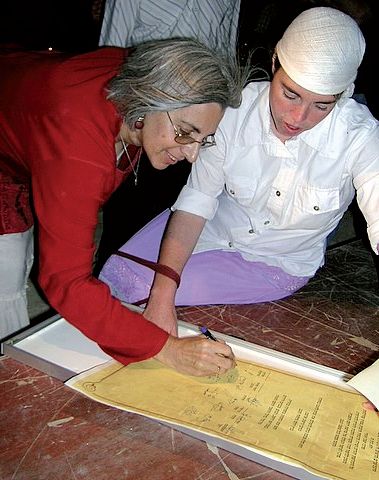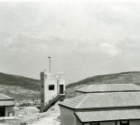
Cornerstone laid for unique “Future of the Desert” building
On October 9, 2007, Yeroham municipal leaders, guests and residents of this Negev development town of 10,000, gathered to lay a cornerstone for the future home of the Atid Bamidbar (literally: “the future is in the desert”) a nonprofit association in Yeroham. High on the hill at the entrance to town, next to the “Statue of Identity” by sculptor Ezra Orion, and facing the beautiful sunset, Mayor Amram Mitzna expressed his appreciation of the work done by Atid Bamidbar and its contribution to Yeroham. Said Mitzna, most organizations build buildings and then begin to develop their activity and prove themselves, while Atid Bamidbar has proven its abilities and contribution to Yeroham and the Negev in its manifold activities, but only now is about to build a building. The donor from Tel Aviv and Adv. Jeff Goodman, Chair of Atid Bamidbar, also spoke about the vision and activities of Atid Bamidbar and its need for a “home” of its own. The moving and impressive ceremony was emceed by Debbie Goldman Golan, Atid Bamidbar co-founder and CEO. Tami Biton and Atid Bamidbar co-founder and director of the association’s Midreshet Be’er Women’s Leadership Program, read the scroll which was signed by many and buried in the earth.
The Atid Bamidbar association has been active in Yeroham since 1990 and fosters educational and cultural activities, works to document, preserve and disseminate the heritage of the town and its various communities, encourages study and creative arts related to Jewish and Israeli culture, and promotes local and regional leadership and initiatives. Atid Bamidbar runs the local communal archives and the Yeroham Identity Card project, as well as the Bamidbar Center for Creative and Open Jewish Study, a regional center for Jewish renewal with programs for youth and adults all over the Negev. In 2006-7, 1500 children, youth and adults were involved in Bamidbar’s 15 weekly or twice-monthly study frameworks, and approximately 10,000 people participated in cultural and communal events and in special programs for more than 80 visiting groups from Israel and abroad, Jews and non-Jews.
After 10 years of working out of a municipal bomb shelter, the association was fortunate to be able to lay the cornerstone for a building of its own, with the help of the Yeroham Local Council and a donor from Tel Aviv. The association hopes that the building to be constructed, once additional funding is located, will contribute to Yeroham and to the Negev, bringing Jews closer to each other and to the common Jewish heritage, in an open, egalitarian approach, through encounters and programs of music and Piyut (Jewish religious poetry from liturgy, holidays and life cycle events put to music), study and creative arts activity.
The ceremony was accompanied by musicians Yigal Dan of the Indian ensemble Tzlilay Rag, and Ariel Karansa, who performed a traditional “Elijah the Prophet” song of the Bnai Israel Indian Jewish community, and a song by Israeli rock star, Ehud Banai (whose last name means “builder” in Hebrew), epitomizing in the choice of optimistic songs that blended old and new, East and West, the work of Atid Bamidbar. Afterwards, former and current participants, guests and residents, gathered in the Culture Hall lobby for a light supper and conversation. The space was decorated with exhibitions featuring drawings, poetry and Jewish texts on the concept of “home”, films and photos of Atid Bamidbar activities. The event was capped by a premier performance in the Negev of the Piyut Choir, affiliated with the Ben-Zvi Institute in Jerusalem, and led by leading Moroccan chazzan/paytan Rabbi Haim Look.
The Piyut choir is a pioneering initiative which joins a wide range of new and fascinating recent cultural developments in the field of Piyut in Israel. The choir is composed of men from all sectors of the religious-ethnic-political spectrum, and thus reflects the ingathering of the exiles which characterizes the State of Israel. The second president of Israel, Yitzhak Ben-Zvi, in whose modest cabin the choir meets weekly for rehearsals, saw the ingathering of Jews from all corners of the world as a central issue. The CEO of Yad Ben-Zvi, Dr. Tzvi Tzameret, says that “there is nothing that connects people more than the singing together of Piyut. There is nothing that connects us to past generations as does Piyut, prayers and blessings. We are very proud of our choir that bridges Jewish ethnic communities and generations,” connecting Israel and the Jewish communities abroad.
The Piyut choir was founded and is accompanied by Dr. Meir Bozaglo, the son of Moroccan Jewry’s leading Paytan in the 20th century, and a member of Avi Chai Foundation’s Board of Governors, which supports the choir and Atid Bamidbar. Avraham Cohen, who organized the choir and directs it, is an actor, musician and group facilitator in “Kehillot Sharot”, the organization founded and directed by Yossi Ohana that brings together Israelis of all kinds around joint singing and studying of Piyut from all Jewish traditions. The artistic director is Yair Harel, musician and director of the Piyut website, also a former facilitator in Kehillot Sharot. Yair has written about the choir’s conductor, “Rabbi Haim Look, a student of Rabbi David Bozaglo, has merited drinking from the purest wellsprings of wisdom and beauty of the poetical tradition of Hebrew poetry….He is a conduit that transmits wonderful and rare knowledge….He enables us to become a link in the chain of generations.”
The Piyut choir performance was chosen to end the ceremonies because its work reflects many of the goals and objectives of Atid Bamidbar (which also runs a weekly Piyut study group jointly with Kehillot Sharot): the joining together of Jews of differing perceptions and practices, the preservation of Jewish cultural traditions while seeking their contemporary significance, creating something new on the basis of the old, and an aspiration for the highest professional standards. But above all, choral singing in itself symbolizes the essence of what we try to do at the Bamidbar Center: foster an ability to listen and be sensitive to each other, mutual respect, integration without domination, where each voice retains its uniqueness but the harmony of the whole is greater than the sum of the voices. The work of both the choir and Atid Bamidbar proves that it is possible to connect and create together despite all that divides us, on the basis of our common Jewish heritage, a living, rich heritage which is being renewed and is relevant for our time.
Atid Bamidbar is still seeking matching funds towards the construction and need another $500,000 to cover building costs and establish a maintenance fund.
-1372404808.jpg) Freda Keet at ESRA Tel Aviv
Freda Keet at ESRA Tel Aviv-1372524003.jpg) the key question
the key question -1372523803.jpg) Volunteering this year- English for Schools
Volunteering this year- English for Schools-1450935317.jpg) Spending a Week in Tel Aviv
Spending a Week in Tel Aviv  Ma'ale Hachamisha
Ma'ale Hachamisha-1450857993.jpg) Jazz in a Pearl Garden
Jazz in a Pearl Garden